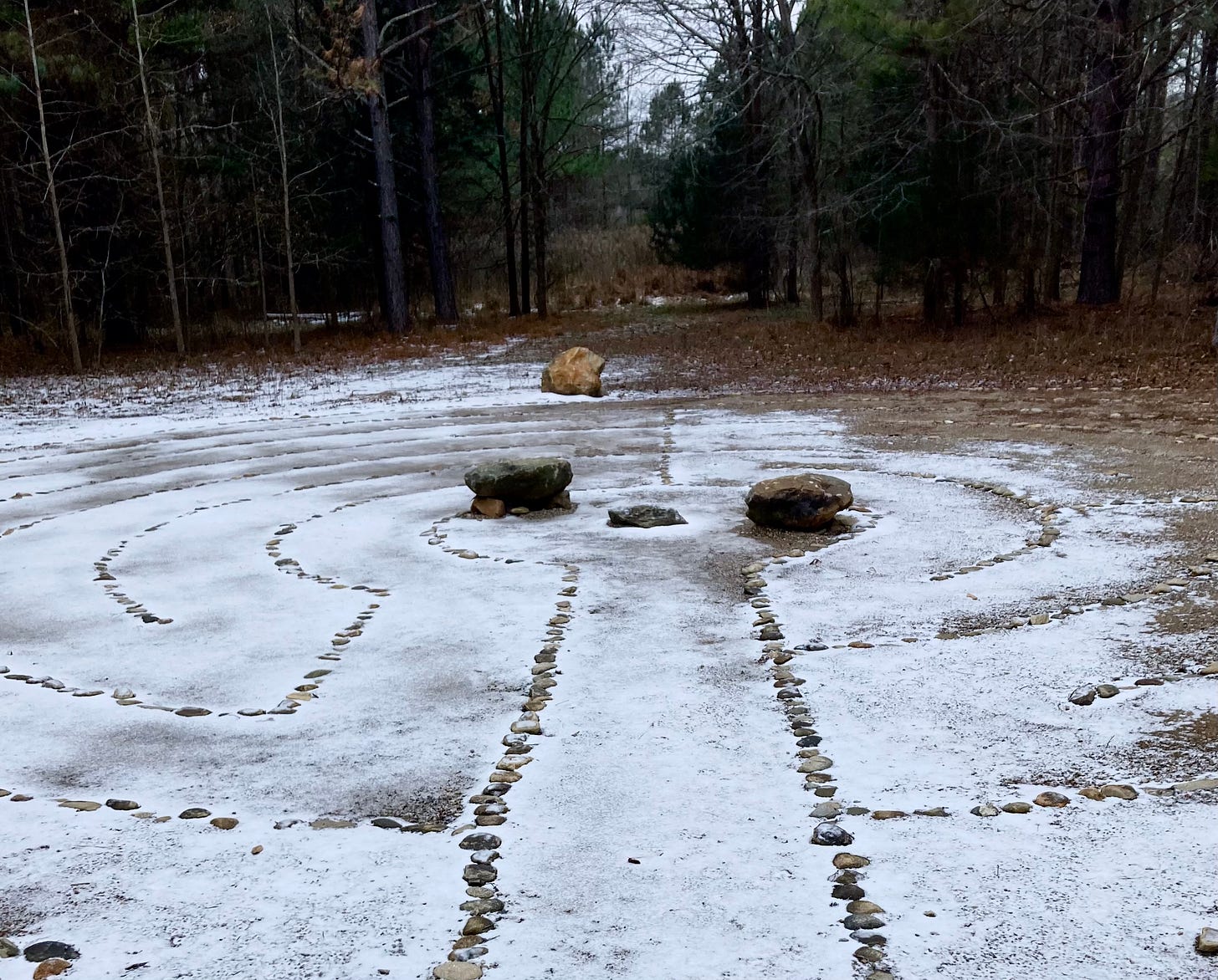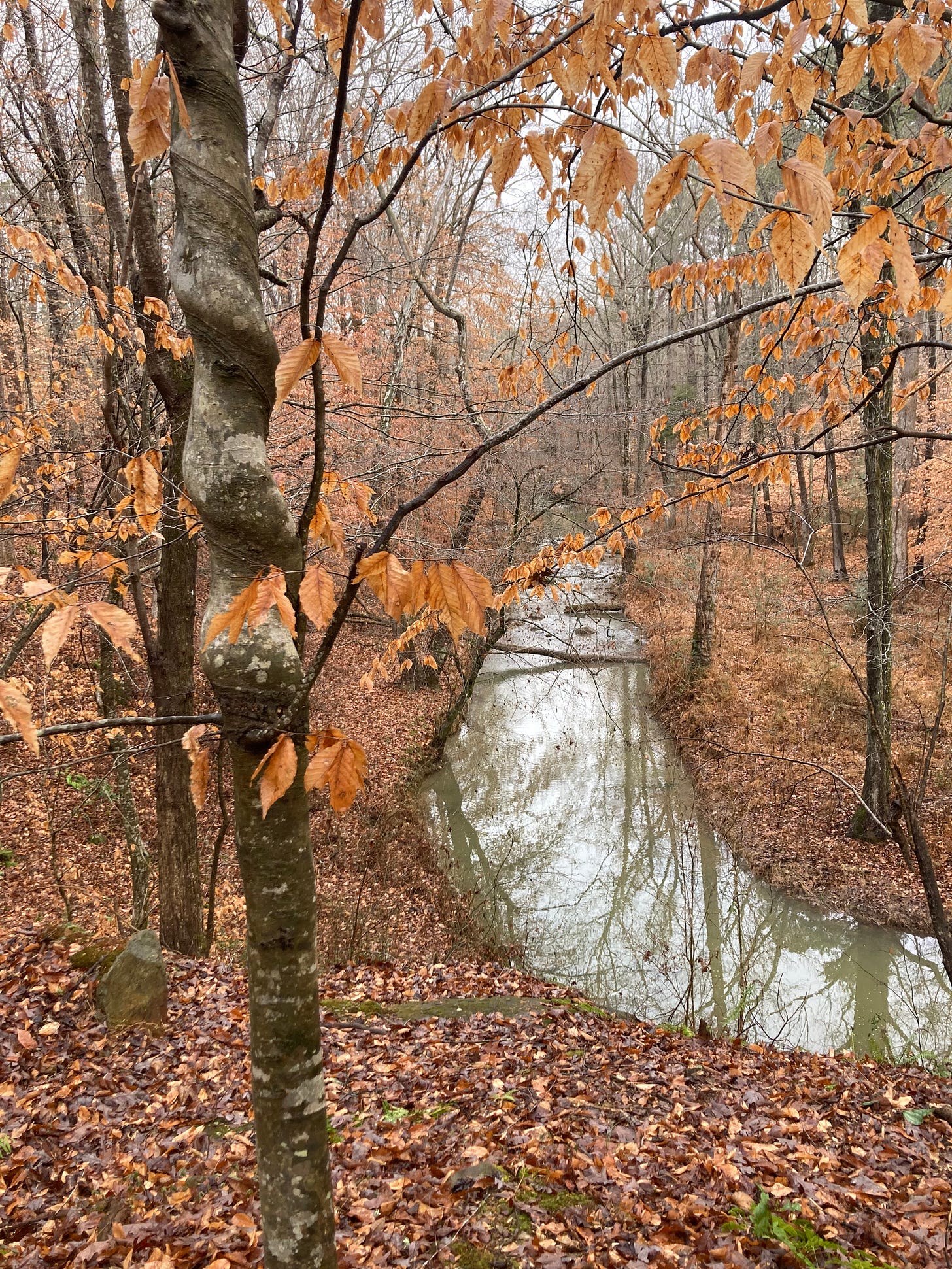In nature’s book of infinite secrecy
a little I can read.
—William Shakespeare
Dear One,
Can you feel it in the air everywhere? There is such an urgent need for calm.
As the new year approaches, in an effort to stay rooted, I find myself leaning hard into the practices that ground me. One of the most sacred and helpful of these is the simple act of walking outside—a stolen hour spent in the rhythm of my own footsteps.
When I walk with intention, my feet, my breath, my senses all locate me. I am gently tethered in the here and now. This is deeply good for the body.
But what about the mind and its inherent human tendency to ruminate on past events and worry about the future? A mind needs something to focus upon, regularly—to protect it from exhausting itself.
For me, a poem can be a protective shelter in a thought-storm, a new window to look out, and a tool for contemplation.
A truly beloved poem is an amulet worn like a prayer-chain around my neck.
Slow reading in the style of lectio divina is like hearing a loved one’s voice. It is like reading a love letter and savoring every single word as a way to experience a closeness with the writer. It is an ancient practice—as old as writing and reading.
I’ve written before about how words and walking can intertwine, like a double-stranded thread to create something strong. This is how the practice of contemplative walking is born—each time anew—breathing. . . relaxing. . . slowing down the mind. . . inviting peace into the body . . .
To practice this with a poem is simple.
Find a piece of poetry that moves you, a poem that feels familiar and comforting. It could be one you’ve known for years, or something newly discovered. I often choose poems that have a single, striking image or phrase that I can hold in my mind as I walk.
Cyprian Consiglio writes:
One of my friends developed the practice of reading and meditating and condensing and simplifying until he came up with the shortest prayer possible drawn from the reading, a word or a short phrase that would serve as a sort of emblem for the reading… he would then write that prayer word or phrase on a little piece of paper and carry it around in his pocket all day. It would become his mantra for the day.
For me, one such poem is Fishing in the Keep of Silence” by Linda Gregg. In this poem, there is an image of God as a fisherman who thinks about poetry all the time. The Poet-fisherman lies down to sleep—trustingly-- dreaming in the lap of the world.
Oh my goodness. The beauty of it. I love to walk around inside this poem.
Here are the lines that I walked with today:
He knows the owls will guard
the sweetness of the soul /
in their massive keep of silence
This poem just works in me.
Good poetry has this way of working—not necessarily through our minds, but through our bodies. It isn’t always about understanding a poem intellectually, though that can come later. I’m only beginning to learn how to read poetry in a more relaxed and intuitive way.
Sometimes, the power of a poem doesn’t reside in what the poet is trying to do, but in what the poem does to us. It’s the way a line can settle into the chest like a breath you didn’t know you were holding, or how a metaphor might cause a tightening in the throat, or a sudden warmth in the belly.
These physical responses are a mystery. The power of words—they free us to feel, not just to think.
We don’t need to parse the meaning of every word, or decode every image, to know that a poem has reached us. It isn’t always about what the poet intended, but about the quiet, subtle ways a poem stirs something deep within.
Reading like this, bypasses the intellect, slipping directly into the heart or the gut or the soul. A poem may be understood on a level I can’t always explain, but I can feel it. And that feeling is enough.

As I walk outside on this cold afternoon, I try to shift my focus. I breathe in the sharp, cool air, and with each exhale, I offer something back to the world—a warm, nourishing breath for the trees and the plants, just as they are offering oxygen to me.
We are all part of this exchange, aren’t we? The world gives us what it has, and we, in turn, give back what we have. This cycle—of breathing, of giving, of receiving—reminds me that we exist because we are in constant relationship, connected to the land, to the air, to each other.
We exist because we exchange.
My dear friend, in this season—with all its beauty and sweetness—I know there is also the weight of darkness. The joy of the season is always tempered by a certain sorrow for me—do you feel it too?—the sorrow of what has been lost, the sorrow of what remains hidden, the sorrow of things broken, whether in our hearts or in the world itself.
I send you love for anything heavy that you’re carrying today.
As I walk today in the winter woods, the cold air of the world bites at my skin, but I’m remembering that love is a constant light born in the midst of darkness. I’m reminded that even in sorrow, there is joy to be found.
Your presence here is a kindness.
I see you, and I am grateful for your attention—the most valuable thing that you possess—it’s something I never take for granted.
Thank you for walking with me this year. Let’s keep walking in the rhythm of the world. Let us find grounding in the stillness, peace in the poetry, and warmth in the simple act of breathing in and breathing out, together.
I’ll see you in a new microseason,
xo Ann
p.s. Here’s a song for you. Enjoy!






Such a beautiful post! Poetry can do the same for me. There are so many treasures out there!
And this is very much true for me:” One of the most sacred and helpful of these is the simple act of walking outside—a stolen hour spent in the rhythm of my own footsteps.
When I walk with intention, my feet, my breath, my senses all locate me. I am gently tethered in the here and now. This is deeply good for the body.”
Wish we could walk together!
Merry Christmas!
Your message has arrived in New Zealand on Christmas morning. What a sweet surprise. Just the best gift to end this year with along with a beautiful song. Thank you.